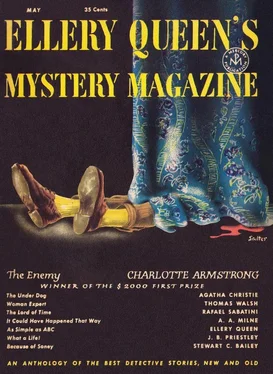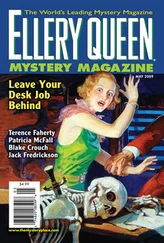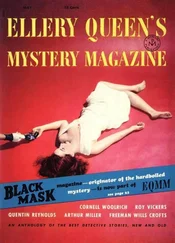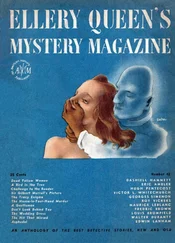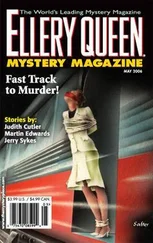Charlotte Armstrong - Ellery Queen’s Mystery Magazine. Vol. 17, No. 90, May 1951
Здесь есть возможность читать онлайн «Charlotte Armstrong - Ellery Queen’s Mystery Magazine. Vol. 17, No. 90, May 1951» весь текст электронной книги совершенно бесплатно (целиком полную версию без сокращений). В некоторых случаях можно слушать аудио, скачать через торрент в формате fb2 и присутствует краткое содержание. Город: New York, Год выпуска: 1951, Издательство: Mercury Publications, Жанр: Детектив, Классический детектив, на английском языке. Описание произведения, (предисловие) а так же отзывы посетителей доступны на портале библиотеки ЛибКат.
- Название:Ellery Queen’s Mystery Magazine. Vol. 17, No. 90, May 1951
- Автор:
- Издательство:Mercury Publications
- Жанр:
- Год:1951
- Город:New York
- ISBN:нет данных
- Рейтинг книги:5 / 5. Голосов: 1
-
Избранное:Добавить в избранное
- Отзывы:
-
Ваша оценка:
- 100
- 1
- 2
- 3
- 4
- 5
Ellery Queen’s Mystery Magazine. Vol. 17, No. 90, May 1951: краткое содержание, описание и аннотация
Предлагаем к чтению аннотацию, описание, краткое содержание или предисловие (зависит от того, что написал сам автор книги «Ellery Queen’s Mystery Magazine. Vol. 17, No. 90, May 1951»). Если вы не нашли необходимую информацию о книге — напишите в комментариях, мы постараемся отыскать её.
Ellery Queen’s Mystery Magazine. Vol. 17, No. 90, May 1951 — читать онлайн бесплатно полную книгу (весь текст) целиком
Ниже представлен текст книги, разбитый по страницам. Система сохранения места последней прочитанной страницы, позволяет с удобством читать онлайн бесплатно книгу «Ellery Queen’s Mystery Magazine. Vol. 17, No. 90, May 1951», без необходимости каждый раз заново искать на чём Вы остановились. Поставьте закладку, и сможете в любой момент перейти на страницу, на которой закончили чтение.
Интервал:
Закладка:
The waiter came nearer still, very close indeed, leaning on the little table and gradually lowering his head. He looked monstrously unlike any possible waiter; a dangerous man. “Now you’ve got to listen to me a minute, Dobby,” he began, in a tone that was hardly above a whisper. “It’s taken me some time to get going. I’m all right here. But if you shop me, I’ll have to go.”
“Yes, and then — what?”
“I know. You needn’t tell me. I’m telling you now. If you shop me, and they turn me off here, I’ve finished. It’s taken me years to get as far as this, but it won’t take five minutes to push me back again. I’m through then. But what about you, Dobby, what about you?”
“What d’you mean?” Mr. Dobby must have been feeling rather uneasy, for he was blustering a little now. “You can’t shop me, Joe, and you needn’t think it. Cleverer men than you have tried to do that, and they missed the bus all right.”
The waiter produced what must have been the shortest and most unpleasant laugh ever heard in that room. He put out a hand, resting all his weight on the other, and though it was a waiter’s hand, it was very large and powerful. “I sha’n’t bother about that, Dobby,” he whispered. “I’ll do it all myself. I’ll put you where you won’t make any trouble again. I sha’n’t have any work to do, and I sha’n’t want any. I’ll spend all my time looking for you, Dobby, and when I’ve found you, I’ll make a good job of it.”
Mr. Dobby was no longer as florid-looking as he had been before, but he tried to carry off the situation. “And that’s been said before, and tried before, and it hasn’t come off.”
“It will this time,” said the waiter. “I sha’n’t do it myself, either. There’ll be two of us. I know where Raspy is. Raspy’s out, y’know, Dobby.”
“Raspy’s out,” the other admitted, uneasily. “But he’s dead.”
“He’s not dead. I saw him, spoke to him, not two months since, and I know where he is now. He wants to meet you again, Dobby, but he thinks you’re a long way off, in South America. You should hear what he says about you, Dobby, and what he’d like to do to you. And the minute I’m turned off here I’m going to Raspy, and then we’ll come looking for you, Dobby. And I mean that. Leave me here and I’ll interfere with nobody, but get me turned out into the street again and I’m a desperate man, see?”
“I see, Joe.”
The waiter drew back from the table. “So just take your little schemes somewhere else, Dobby. You’re not trying anything on here.”
Mr. Dobby rose from his chair and made for the door. “All right, Joe. Keep on being a good boy. So long.” He carried it off with his customary swagger, but there could be no denying that he had lost the rubber.
The waiter did not follow him out. He stood motionless for several minutes, breathing deeply, like a man who had just saved his skin only by the fraction of an inch. Then something seemed to happen to him; he shrank a little; the light died out of his eyes; certain lines vanished from his face; and, in fact, he turned into a middle-aged waiter again. There were a glass and an empty soda-water bottle to remove. He removed them.
“Well, here we are again,” said the first young man.
“I’ll push off in a minute, old man,” said the second young man, seating himself on the arm of a chair. “I’ve a busy day tomorrow.”
“You’ve time for a quick one.”
And he rang the bell. The same old waiter appeared. “Two whiskies, please.”
“Two whiskies, sir,” the waiter replied, in a colorless voice. “Yes, sir.”
The second young man yawned and then glanced round the room. “Don’t: stay in this hole again.”
“Wait a minute,” cried the first young man. “This room has actually had a customer or guest or visitor in it since we left. I smell cigar smoke and I see here the stump of a cigar. You know my methods, Watson.”
“I can’t believe it. I think the waiter must have come in and smoked it on the sly.”
The waiter returned. “I’m going off duty now, sir, but if you want anything else, the night porter’ll get it.”
“Thanks, but I sha’n’t. Here you are.”
“Thank you, sir.”
“Still very quiet here, waiter.”
“Very quiet just now, sir,” And the waiter picked up his tray and departed.
“Not a bad chap, that waiter, but — my hat! — what a life!”
“What a life! Well — cheerio!”
“Cheerio!”
As Simple as ABC
by Ellery Queen
This is a very old story as Queen stories go. It happened in Ellery’s salad days, when he was tossing his talents about like a Sunday chef, and a redheaded girl named Nikki Porter had just attached herself to his typewriter. But it has not staled, this story; it has an unwithering flavor which those who partook of it relish to this day. There are gourmets in America whose taste-buds leap at any concoction dated 1861–1865. To such, the mere recitation of ingredients like Bloody Angle, Minié balls, Little Mac, Tenting Tonight , the brand of General Grant’s whiskey, not to mention Father Abraham, is sufficient to start the passionate flow of juices. These are the misty-hearted to whom the Civil War is “the War” and the blue-gray armies rather more than men. Romantics, if you will; garnishers of history. But it is they who pace the lonely sentrypost by the night Potomac, they who hear the creaking of the ammunition wagons, the snap of campfires, the scream of the thin gray line and the long groan of the battlefield. They personally flee the burning hell of the Wilderness as the dead rise and twist in the flames; under lanterns, in the flickering mud, they stoop compassionately with the surgeons over quivering heaps. It is they who keep the little flags flying and the ivy ever green on the graves of the old men.
Ellery is of this company, and that is why he regards the case of the old men of Jacksburg, Pennsylvania, with particular affection.
Ellery and Nikki came upon the village of Jacksburg as people often come upon the best things, unpropitiously. They had been driving back to New York from Washington, where Ellery had done some sleuthing among the stacks of the Library of Congress. Perhaps the sight of the Potomac, Arlington’s eternal geometry, Lincoln frozen in giant sadness, brought its weight to bear upon Ellery’s decision to veer towards Gettysburg, where murder had been national. And Nikki had never been there, and May was coming to its end. There was a climate of sentiment.
They crossed the Marуland-Pennsylvania line and spent timeless hours wandering over Culp’s Hill and Seminary Ridge and Little Round Top and Spangler’s Spring among the watchful monuments. It is a place of everlasting life, where Pickett and Jeb Stuart keep charging to the sight of those with eyes to see, where the blood spills fresh if colorlessly, and the highpitched tones of a tall and ugly man still ring out over the graves. When they left, Ellery and Nikki were in a mood of wonder, unconscious of time or place, oblivious to the darkening sky and the direction in which the nose of the Duesenberg pointed. So in time they were disagreeably awakened by the alarm clock of nature. The sky had opened on their heads, drenching them to the skin instantly. From the horizon behind, them Gettysburg was a battlefield again, sending great flashes of fire through the darkness to the din of celestial cannon. Ellery stopped the car and put the top up, but the mood was drowned when he discovered that something ultimate had happened to the ignition system. They were marooned in a faraway land, Nikki moaned.
“We can’t go on in these wet clothes, Ellery!”
“Do you suggest that we stay here in them? I’ll get this crackerbox started if...” But at that moment the watery lights of a house wavered on somewhere ahead, and Ellery became cheerful again.
Читать дальшеИнтервал:
Закладка:
Похожие книги на «Ellery Queen’s Mystery Magazine. Vol. 17, No. 90, May 1951»
Представляем Вашему вниманию похожие книги на «Ellery Queen’s Mystery Magazine. Vol. 17, No. 90, May 1951» списком для выбора. Мы отобрали схожую по названию и смыслу литературу в надежде предоставить читателям больше вариантов отыскать новые, интересные, ещё непрочитанные произведения.
Обсуждение, отзывы о книге «Ellery Queen’s Mystery Magazine. Vol. 17, No. 90, May 1951» и просто собственные мнения читателей. Оставьте ваши комментарии, напишите, что Вы думаете о произведении, его смысле или главных героях. Укажите что конкретно понравилось, а что нет, и почему Вы так считаете.
